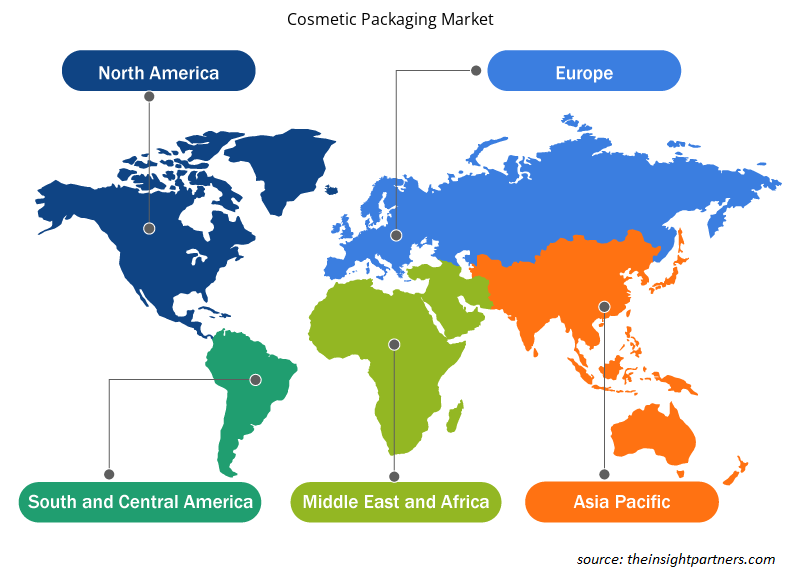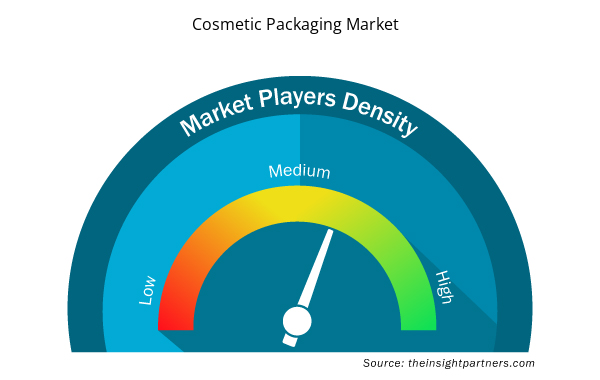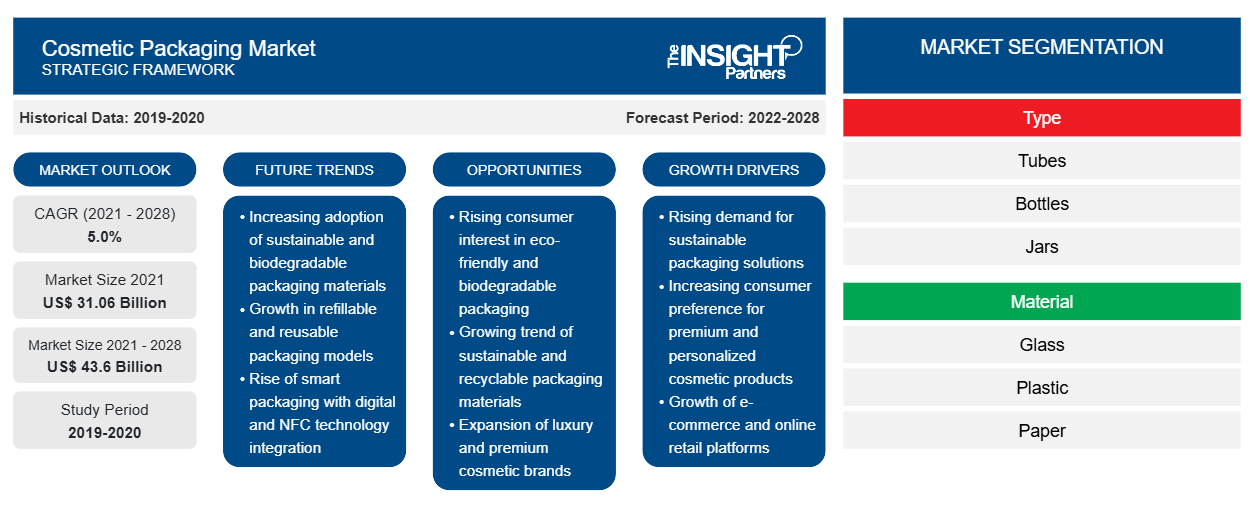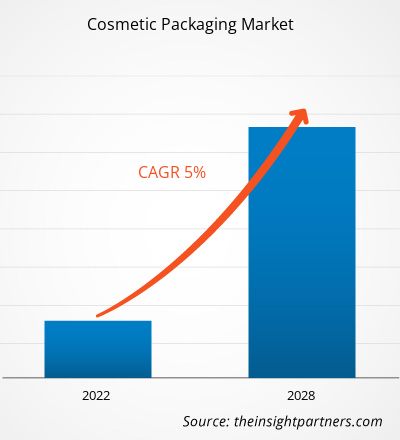Der Markt für Kosmetikverpackungen wurde im Jahr 2021 auf 31.064,7 Millionen US-Dollar geschätzt und soll bis 2028 43.597,9 Millionen US-Dollar erreichen; von 2021 bis 2028 wird ein durchschnittliches jährliches Wachstum von 5,0 % erwartet.
Das Wachstum des Marktes wird der schnell wachsenden Kosmetikindustrie, dem steigenden Trend zum Tragen von Make-up bei Frauen und der steigenden Zahl von Make-up-Studios, Schönheitskliniken und Salons auf der ganzen Welt zugeschrieben. Darüber hinaus konzentrieren sich die Hersteller darauf, ein besseres Verpackungsdesign zu entwickeln und ihr Produkt durch innovative Verpackungen intelligent zu vermarkten, um Verbraucher anzuziehen. Auch der wachsende Verkauf von Kosmetikprodukten über Online-Einzelhandelskanäle würde das Marktwachstum im Prognosezeitraum stärken.
Im Jahr 2020 hielt der asiatisch-pazifische Raum den größten Anteil am globalen Markt für Kosmetikverpackungen und wird im Prognosezeitraum voraussichtlich die höchste durchschnittliche jährliche Wachstumsrate (CAGR) auf dem Markt verzeichnen. Der Markt im asiatisch-pazifischen Raum ist in China, Indien, Japan, Südkorea und Australien unterteilt. Länder wie Südkorea, China und Japan gehören aufgrund der wachsenden Beliebtheit ihrer einzigartigen Make-up- und Hautpflegeroutinen zu den wichtigsten Märkten für Kosmetik- und Körperpflegeprodukte. Der Markt für Kosmetikverpackungen im asiatisch-pazifischen Raum verzeichnet aufgrund der raschen Urbanisierung, der bemerkenswerten wirtschaftlichen Entwicklung, der kulturellen Vielfalt und der zunehmenden Akzeptanz neuer Make-up-Trends ein erhebliches Wachstum.
Passen Sie diesen Bericht Ihren Anforderungen an
Sie erhalten kostenlose Anpassungen an jedem Bericht, einschließlich Teilen dieses Berichts oder einer Analyse auf Länderebene, eines Excel-Datenpakets sowie tolle Angebote und Rabatte für Start-ups und Universitäten.
- Holen Sie sich die wichtigsten Markttrends aus diesem Bericht.Dieses KOSTENLOSE Beispiel umfasst eine Datenanalyse von Markttrends bis hin zu Schätzungen und Prognosen.
Auswirkungen der COVID-19-Pandemie auf den Markt für Kosmetikverpackungen
Die COVID-19-Pandemie hat die Betriebseffizienz des Fertigungssektors aufgrund längerer Lockdowns in verschiedenen Regionen, Schließung von Produktionseinheiten, Reise-, internationalen Handels- und Lieferkettenbeschränkungen sowie Rohstoffknappheit erheblich beeinträchtigt. Die COVID-19-Pandemie hat sich aufgrund von Schließung von Produktionseinheiten, steigenden Rohstoffpreisen, Arbeitskräftemangel, Unterbrechung der Lieferketten und finanzieller Instabilität negativ auf den globalen Markt für Kosmetikverpackungen ausgewirkt. Darüber hinaus hat die Störung der Kosmetikindustrie aufgrund der durch den COVID-19-Ausbruch verursachten wirtschaftlichen Abschwächung das Wachstum des Marktes für Kosmetikverpackungen gebremst. Die Unternehmen gewinnen jedoch an Boden, da zuvor verhängte Beschränkungen in verschiedenen Ländern gelockert werden. Darüber hinaus hat die Einführung von COVID-19-Impfstoffen durch Regierungen verschiedener Länder die Situation weiter entspannt und zu einem Anstieg der Geschäftsaktivitäten auf der ganzen Welt geführt. Darüber hinaus planen Regierungen verschiedener Länder, eine moderne und technologisch fortschrittliche Infrastruktur zu entwickeln, um die wirtschaftlichen Auswirkungen der Pandemie abzumildern. Während des Lockdowns führten Verbraucher Hautpflegebehandlungen und -therapien zu Hause durch, was die Nachfrage nach Kosmetikprodukten erheblich angekurbelt hat. Daher wird erwartet, dass der Markt für Kosmetikverpackungen trotz der Auswirkungen der COVID-19-Pandemie in den kommenden Jahren ein deutliches Wachstum verzeichnen wird.
Markteinblicke
Wachsende Kosmetikindustrie
In den letzten Jahren ist das Bewusstsein für das persönliche Erscheinungsbild bei den Menschen gestiegen, was zu einer erhöhten Nachfrage nach Kosmetikprodukten geführt hat. Nordamerika und Europa gelten als die größten Kosmetikmärkte weltweit. Laut den Daten von L'Oreal verzeichnete die globale Kosmetikindustrie im Jahr 2019 eine Wachstumsrate von 5,5 %. Laut Cosmetics Europe wuchs der europäische Kosmetikmarkt von 89,30 US-Dollar im Jahr 2018 auf 90,66 US-Dollar im Jahr 2019. Zudem wird erwartet, dass eine erhöhte Nachfrage nach Kosmetika aufgrund der veränderten Pflegetrends bei Männern und Frauen die Kosmetikindustrie ankurbeln wird. In den letzten Jahren hat sich die Branche von einer auf Frauen ausgerichteten Produktbasis zu einer Branche für alle Geschlechter gewandelt, was die Verbraucherbasis der Branche erweitert hat. Die wachsende Verbraucherbasis der Kosmetikindustrie hat zu einer hohen Nachfrage nach Kosmetikverpackungsprodukten geführt, was das Marktwachstum weiter vorantreibt.
Anwendungseinblicke
Basierend auf der Anwendung ist der globale Markt für Kosmetikverpackungen in Hautpflege, Haarpflege, Mundpflege und andere unterteilt. Im Jahr 2020 machte das Segment Hautpflege den größten Umsatzanteil aus. Die steigende Zahl von Beauty-Influencern bringt verschiedene Make-up- und Hautpflege-Tutorials heraus, die bei den Menschen immer beliebter werden. Darüber hinaus treibt der zunehmende Trend zur Verwendung von Produkten wie Sonnenschutzcreme, hautregenerierenden Nachtcremes und Parfümen die Nachfrage nach Hautpflegeprodukten an. Die Kosmetikverpackung wird für verschiedene Hautpflegeprodukte wie Feuchtigkeitscremes, Handcremes, Reinigungsmittel und Peelings verwendet. Die Verpackung von Hautpflegeprodukten soll das Produkt vor Luft, Licht, Hitze, Kälte, Feuchtigkeit, Staub und Schmutz schützen und es vor Manipulationen schützen. Beispielsweise wird Polypropylenverpackung aufgrund seiner Flexibilität in einer Vielzahl von Hautpflegeprodukten verwendet, was sie zu einer hervorragenden Wahl für Quetschtuben macht. Darüber hinaus haben Hautpflegemarken begonnen, die Umweltvorteile von Hautpflegeverpackungen zu erkennen.
ALBEA; APC PACKAGING; AptarGroup, Inc.; Berry Global Inc.; Gerresheimer AG; WWP Beauty; Silgan Plastics.; Huhtamaki; LIBO Cosmetics; und HCP Packaging gehören zu den Akteuren auf dem Markt für Kosmetikverpackungen. Diese Unternehmen bieten dem Markt ein breites Produktportfolio. Die Unternehmen sind in den Entwicklungsregionen vertreten, was lukrative Möglichkeiten für das Wachstum des Marktes für Kosmetikverpackungen bietet. Die Marktteilnehmer entwickeln qualitativ hochwertige und innovative Produkte, um die Anforderungen der Kunden zu erfüllen.
Bericht-Spotlights
- Fortschrittliche Branchentrends auf dem Markt für Kosmetikverpackungen helfen den Akteuren bei der Entwicklung wirksamer langfristiger Strategien
- In Industrie- und Entwicklungsländern angewandte Strategien für Unternehmenswachstum
- Quantitative Analyse des Kosmetikverpackungsmarktes von 2019 bis 2028
- Schätzung der weltweiten Nachfrage nach Kosmetikverpackungen
- Porters Fünf-Kräfte-Analyse zur Veranschaulichung der Wirksamkeit von Käufern und Lieferanten in der Branche
- Aktuelle Entwicklungen zum Verständnis des wettbewerbsorientierten Marktszenarios
- Markttrends und -aussichten sowie Faktoren, die das Wachstum des Kosmetikverpackungsmarktes vorantreiben und bremsen
- Unterstützung im Entscheidungsprozess durch Aufzeigen von Marktstrategien, die das kommerzielle Interesse untermauern und zum Marktwachstum führen
- Die Größe des Kosmetikverpackungsmarktes an verschiedenen Knotenpunkten
- Detaillierte Übersicht und Segmentierung des Marktes sowie der Dynamik der Kosmetikverpackungsindustrie
- Größe des Kosmetikverpackungsmarktes in verschiedenen Regionen mit vielversprechenden Wachstumschancen
Regionale Einblicke in den Kosmetikverpackungsmarkt
Die regionalen Trends und Faktoren, die den Kosmetikverpackungsmarkt im Prognosezeitraum beeinflussen, wurden von den Analysten von Insight Partners ausführlich erläutert. In diesem Abschnitt werden auch die Marktsegmente und die Geografie des Kosmetikverpackungsmarkts in Nordamerika, Europa, im asiatisch-pazifischen Raum, im Nahen Osten und Afrika sowie in Süd- und Mittelamerika erörtert.

- Erhalten Sie regionale Daten zum Kosmetikverpackungsmarkt
Umfang des Marktberichts über Kosmetikverpackungen
| Berichtsattribut | Details |
|---|---|
| Marktgröße im Jahr 2021 | 31,06 Milliarden US-Dollar |
| Marktgröße bis 2028 | 43,6 Milliarden US-Dollar |
| Globale CAGR (2021 - 2028) | 5,0 % |
| Historische Daten | 2019-2020 |
| Prognosezeitraum | 2022–2028 |
| Abgedeckte Segmente | Nach Typ
|
| Abgedeckte Regionen und Länder | Nordamerika
|
| Marktführer und wichtige Unternehmensprofile |
|
Marktteilnehmerdichte: Der Einfluss auf die Geschäftsdynamik
Der Markt für Kosmetikverpackungen wächst rasant, angetrieben durch die steigende Nachfrage der Endverbraucher aufgrund von Faktoren wie sich entwickelnden Verbraucherpräferenzen, technologischen Fortschritten und einem größeren Bewusstsein für die Vorteile des Produkts. Mit steigender Nachfrage erweitern Unternehmen ihr Angebot, entwickeln Innovationen, um die Bedürfnisse der Verbraucher zu erfüllen, und nutzen neue Trends, was das Marktwachstum weiter ankurbelt.
Die Marktteilnehmerdichte bezieht sich auf die Verteilung von Firmen oder Unternehmen, die in einem bestimmten Markt oder einer bestimmten Branche tätig sind. Sie gibt an, wie viele Wettbewerber (Marktteilnehmer) in einem bestimmten Marktraum im Verhältnis zu seiner Größe oder seinem gesamten Marktwert präsent sind.
Die wichtigsten auf dem Markt für Kosmetikverpackungen tätigen Unternehmen sind:
- ALBEA SA
- APC-VERPACKUNG
- Gesellschaften, beginnend mit APTA
- BERRY GLOBAL INC.
- Gerresheimer AG
Haftungsausschluss : Die oben aufgeführten Unternehmen sind nicht in einer bestimmten Reihenfolge aufgeführt.

- Überblick über die wichtigsten Akteure auf dem Kosmetikverpackungsmarkt
Die „Globale Marktanalyse für Kosmetikverpackungen bis 2028“ ist eine spezialisierte und eingehende Studie der Chemie- und Materialindustrie mit besonderem Schwerpunkt auf der globalen Trendanalyse des Kosmetikverpackungsmarktes. Der Bericht soll einen Überblick über den Markt mit detaillierter Marktsegmentierung geben. Der Markt für Kosmetikverpackungen ist nach Produkttyp, Material, Anwendung und Geografie segmentiert. Nach Typ ist der Markt für Kosmetikverpackungen in Tuben, Flaschen, Tiegel, Pumpen und Spender und andere unterteilt. Nach Material ist der Markt in Glas, Kunststoff, Papier, Metall und andere unterteilt. Nach Anwendung ist der Markt für Kosmetikverpackungen in Hautpflege, Haarpflege, Mundpflege und andere unterteilt. Nach Geografie ist der Markt grob in Nordamerika, Europa, Asien-Pazifik (APAC), Naher Osten und Afrika (MEA) sowie Süd- und Mittelamerika unterteilt.
Firmenprofile
- ALBEA
- APC-VERPACKUNG
- AptarGroup, Inc.
- Berry Global Inc.
- Gerresheimer AG
- WWP Schönheit
- Silgan-Kunststoffe.
- Huhtamaki
- LIBO Kosmetik
- HCP-Verpackung
- Historische Analyse (2 Jahre), Basisjahr, Prognose (7 Jahre) mit CAGR
- PEST- und SWOT-Analyse
- Marktgröße Wert/Volumen – Global, Regional, Land
- Branche und Wettbewerbsumfeld
- Excel-Datensatz



Report Coverage
Revenue forecast, Company Analysis, Industry landscape, Growth factors, and Trends

Segment Covered
This text is related
to segments covered.

Regional Scope
North America, Europe, Asia Pacific, Middle East & Africa, South & Central America

Country Scope
This text is related
to country scope.
Häufig gestellte Fragen
The rise in sustainable and eco-friendly packaging is the key trend for the global cosmetic packaging market. The use of plastic packaging in the cosmetic industry has a harmful impact on the environment. This has led to an increased focus on developing sustainable and environment-friendly packaging.
Based on type, the bottle segment led the global cosmetic packaging market in 2020. Cosmetic products need protection from oxygen exposure, dust and cross-contaminants may affect the quality of the product. Bottles are available in different sizes and shapes, and are made of plastic or glass. Glass bottles are a popular choice for cosmetic packaging. Glass bottles enhance the product packaging in terms of quality.
Based on application, skin care is expected to be the fastest growing segment during the forecast period. The skin care products include face cream, moisturizers, cleansers, face wash, and sunscreen. Continuous technological developments in the cosmetics and personal care sectors coupled with innovations and research & development expenditures are expected to propel the growth of cosmetic packaging.
In 2020, Asia Pacific accounted for the largest share of the global cosmetic packaging market. The cosmetic packaging industry is anticipated to expand faster due to increasing awareness of skin care, hair care, and personal care.
The growth of the cosmetic industry and rising demand for flexible packaging drives the global cosmetic packaging market. Awareness about external beauty has become one of the major driving factors for the use of cosmetics across the globe. Innovative package designs and increasing demand for cosmetics due to the growing youth population are anticipated to drive the market.
Some of the major players operating in the global cosmetic packaging market are ALBEA; APC PACKAGING; AptarGroup, Inc.; Berry Global Inc.; Gerresheimer AG; WWP Beauty; Silgan Plastics.; Huhtamaki; LIBO Cosmetics.; and HCP Packaging.
Trends and growth analysis reports related to Chemicals and Materials : READ MORE..
The List of Companies - Cosmetic Packaging Market
- ALBEA SA
- APC PACKAGING
- APTARGROUP, INC.
- BERRY GLOBAL INC.
- Gerresheimer AG
- HCP Packaging
- Huhtamaki Global
- Libo Cosmetics Co., Ltd.
- Silgan Plastics
- WWP Beauty
- PORATION
The Insight Partners performs research in 4 major stages: Data Collection & Secondary Research, Primary Research, Data Analysis and Data Triangulation & Final Review.
- Data Collection and Secondary Research:
As a market research and consulting firm operating from a decade, we have published and advised several client across the globe. First step for any study will start with an assessment of currently available data and insights from existing reports. Further, historical and current market information is collected from Investor Presentations, Annual Reports, SEC Filings, etc., and other information related to company’s performance and market positioning are gathered from Paid Databases (Factiva, Hoovers, and Reuters) and various other publications available in public domain.
Several associations trade associates, technical forums, institutes, societies and organization are accessed to gain technical as well as market related insights through their publications such as research papers, blogs and press releases related to the studies are referred to get cues about the market. Further, white papers, journals, magazines, and other news articles published in last 3 years are scrutinized and analyzed to understand the current market trends.
- Primary Research:
The primarily interview analysis comprise of data obtained from industry participants interview and answers to survey questions gathered by in-house primary team.
For primary research, interviews are conducted with industry experts/CEOs/Marketing Managers/VPs/Subject Matter Experts from both demand and supply side to get a 360-degree view of the market. The primary team conducts several interviews based on the complexity of the markets to understand the various market trends and dynamics which makes research more credible and precise.
A typical research interview fulfils the following functions:
- Provides first-hand information on the market size, market trends, growth trends, competitive landscape, and outlook
- Validates and strengthens in-house secondary research findings
- Develops the analysis team’s expertise and market understanding
Primary research involves email interactions and telephone interviews for each market, category, segment, and sub-segment across geographies. The participants who typically take part in such a process include, but are not limited to:
- Industry participants: VPs, business development managers, market intelligence managers and national sales managers
- Outside experts: Valuation experts, research analysts and key opinion leaders specializing in the electronics and semiconductor industry.
Below is the breakup of our primary respondents by company, designation, and region:

Once we receive the confirmation from primary research sources or primary respondents, we finalize the base year market estimation and forecast the data as per the macroeconomic and microeconomic factors assessed during data collection.
- Data Analysis:
Once data is validated through both secondary as well as primary respondents, we finalize the market estimations by hypothesis formulation and factor analysis at regional and country level.
- Macro-Economic Factor Analysis:
We analyse macroeconomic indicators such the gross domestic product (GDP), increase in the demand for goods and services across industries, technological advancement, regional economic growth, governmental policies, the influence of COVID-19, PEST analysis, and other aspects. This analysis aids in setting benchmarks for various nations/regions and approximating market splits. Additionally, the general trend of the aforementioned components aid in determining the market's development possibilities.
- Country Level Data:
Various factors that are especially aligned to the country are taken into account to determine the market size for a certain area and country, including the presence of vendors, such as headquarters and offices, the country's GDP, demand patterns, and industry growth. To comprehend the market dynamics for the nation, a number of growth variables, inhibitors, application areas, and current market trends are researched. The aforementioned elements aid in determining the country's overall market's growth potential.
- Company Profile:
The “Table of Contents” is formulated by listing and analyzing more than 25 - 30 companies operating in the market ecosystem across geographies. However, we profile only 10 companies as a standard practice in our syndicate reports. These 10 companies comprise leading, emerging, and regional players. Nonetheless, our analysis is not restricted to the 10 listed companies, we also analyze other companies present in the market to develop a holistic view and understand the prevailing trends. The “Company Profiles” section in the report covers key facts, business description, products & services, financial information, SWOT analysis, and key developments. The financial information presented is extracted from the annual reports and official documents of the publicly listed companies. Upon collecting the information for the sections of respective companies, we verify them via various primary sources and then compile the data in respective company profiles. The company level information helps us in deriving the base number as well as in forecasting the market size.
- Developing Base Number:
Aggregation of sales statistics (2020-2022) and macro-economic factor, and other secondary and primary research insights are utilized to arrive at base number and related market shares for 2022. The data gaps are identified in this step and relevant market data is analyzed, collected from paid primary interviews or databases. On finalizing the base year market size, forecasts are developed on the basis of macro-economic, industry and market growth factors and company level analysis.
- Data Triangulation and Final Review:
The market findings and base year market size calculations are validated from supply as well as demand side. Demand side validations are based on macro-economic factor analysis and benchmarks for respective regions and countries. In case of supply side validations, revenues of major companies are estimated (in case not available) based on industry benchmark, approximate number of employees, product portfolio, and primary interviews revenues are gathered. Further revenue from target product/service segment is assessed to avoid overshooting of market statistics. In case of heavy deviations between supply and demand side values, all thes steps are repeated to achieve synchronization.
We follow an iterative model, wherein we share our research findings with Subject Matter Experts (SME’s) and Key Opinion Leaders (KOLs) until consensus view of the market is not formulated – this model negates any drastic deviation in the opinions of experts. Only validated and universally acceptable research findings are quoted in our reports.
We have important check points that we use to validate our research findings – which we call – data triangulation, where we validate the information, we generate from secondary sources with primary interviews and then we re-validate with our internal data bases and Subject matter experts. This comprehensive model enables us to deliver high quality, reliable data in shortest possible time.


 Holen Sie sich ein kostenloses Muster für diesen Bericht
Holen Sie sich ein kostenloses Muster für diesen Bericht